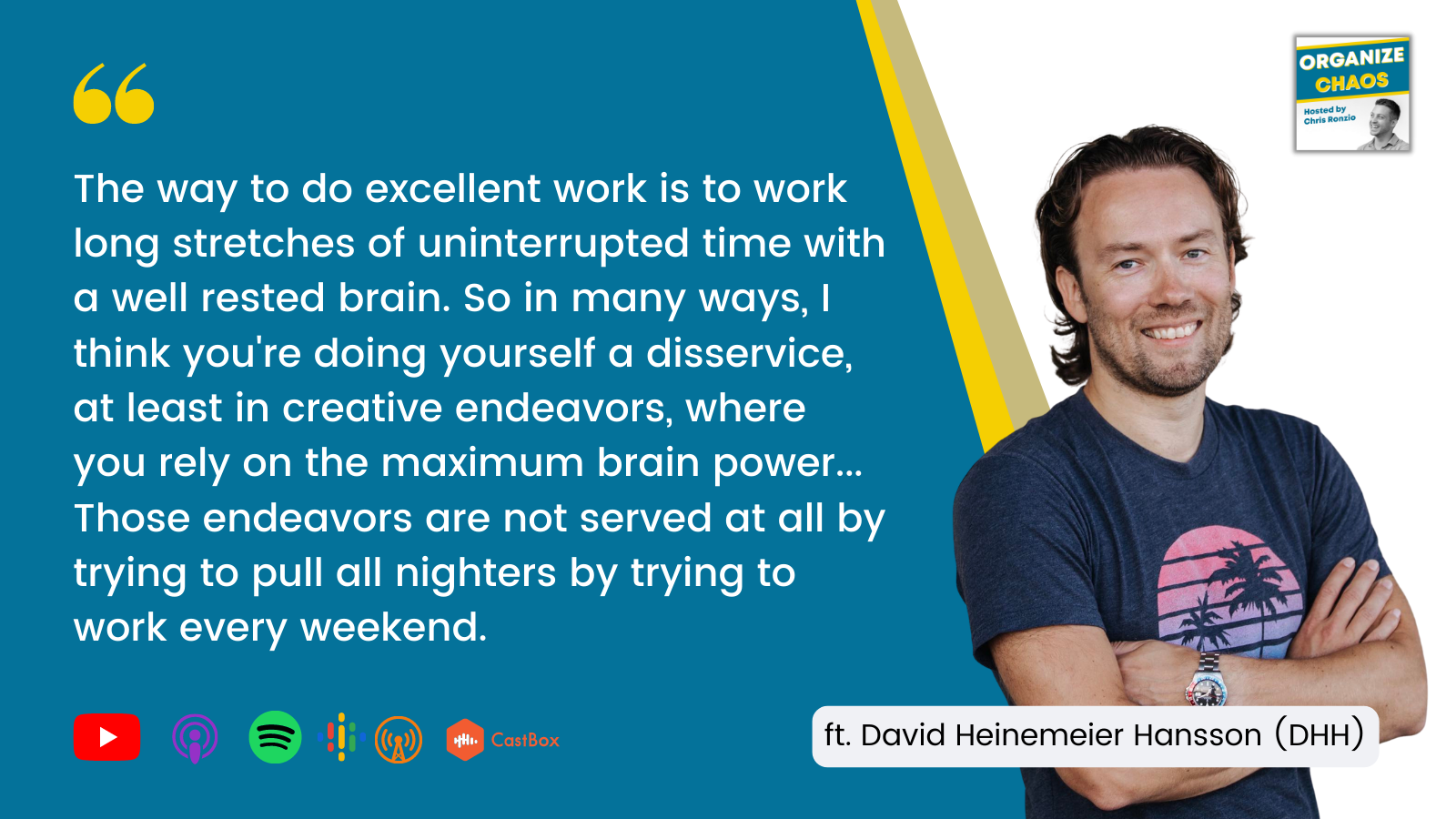
Articles
Has hustle culture taken over your company? Here’s why moving slower is faster.
April 29, 2022

Hustle culture is synonymous with the startup world. As the theory goes, you can’t be successful unless you put in 80-hour weeks and push yourself to the brink of exhaustion to produce more.
But for David Heinemeier Hansson, co-founder of Basecamp and Hey, work doesn’t have to be overwhelming. And he believes you’re actually more productive when it’s calm, intentional, and only takes eight hours of your day.
David recently joined us on the Organize Chaos podcast to talk about his current endeavors and newest book: “It Doesn’t Have to be Crazy at Work.” In this episode, he shares why everyone should stop celebrating hustle culture and avoid the chaos that comes from hustling harder:
"Maniacal ambition" doesn’t equal mega success.
David says the problem with hustle culture is that it advertises an unnecessary workload. He calls it “maniacal ambition” and believes entrepreneurs use it too early in their journey.
“[Hustling entrepreneurs] that just got started are in such a rush to become a mega success that they feel like they have to pour in everything they've got,” David told us. When instead, they could be working intentionally to get just as much — if not more — accomplished.
“[We want to debunk] that you're never going to amount to anything unless you simply kill yourself trying to achieve your goals,” David shared. Their first piece of evidence: choosing to run Basecamp intentionally versus chaotically. Today, they’re a $100 billion company.
David also says that being small isn't always a stepping stone to something bigger. Some companies operate best with only 12 people, and there’s “nothing to apologize for that.”
Stop hustling, set the example, and prevent hustle culture.
Deconstructing the hustle culture starts with business leaders. And if you’re ready to stop the chaos at work, you can use a few tips that David shared on the podcast:
1. Stack the odds in your favor.
Not many startups will become billion-dollar companies, but plenty will grow into profitable businesses. And when you recognize these odds, you can be more rational about your goals and intentional with your next move.
“It’s still difficult [to build a sustainable business], but it's much easier than trying to become a unicorn.”
– David Heinemeier Hansson, co-founder of Basecamp and Hey
Shooting for the moon from day one can make your ambitions unrealistic. And it can contribute to a chaotic culture in the long run. But when you consider the smaller steps at first, you embrace the calm and patience that comes with reasonable expectations.
2. Work in a way that works.
David believes that hustling doesn’t actually accomplish much — besides constant busyness. “Many of these people are just thrashing all over the place, spinning their wheels, and producing a bunch of smoke,” he told us. And what you actually need is some focused, intentional time.
“You can work much better, be more productive, and have better access to fulfill that ambition if you work in a way that works. And for us, that's uninterrupted time.”
For David, eight hours a day is plenty, and 40 hours is more than enough per week. It’s about how you convert that into uninterrupted blocks of time that make the difference. And if you can carve out two to four hours of undisturbed focus, you’ll run circles around hustlers.

3. Set boundaries and pick the most critical task.
There is an unlimited amount of work in running a business. And if you let yourself, you could probably put in 100-hour weeks. That’s why David suggests setting boundaries, so you commit to logging off after eight-hour days.
“You've got to tell yourself that you're going to work within that boundary, be disciplined, and respect that boundary of how many hours you're going to work.”
Setting boundaries isn’t only good for your mental health; it’s also helpful for identifying the right things to work on next. “The brain is quite good at picking the most important things when it has a boundary,” David explained.
For example, instead of scattering your energy on multiple projects, focus on solving one problem during the workday. This way, you have more creative energy to find the right solution. And you’ll see the progress of your actions, which makes work feel more meaningful.
4. Drop unnecessary meetings.
David’s most straightforward advice is to start dropping meetings immediately and replace them with asynchronous communication. AKA, something like Basecamp.
“Meetings are probably the most toxic time sync that wastes people’s attention and creative energy every week,” David told us. Instead, he prefers spending one hour a week on meetings with his business partner.
When David needs to communicate or collaborate outside these meetings, he emails with Hey or drops messages in Basecamp. So there’s no need to match schedules or interrupt the workday.
5. Set the example.
Once you commit to a calm workday, it’s your job to set an example for the workplace. “[At our companies], we set a culture that [calm] is not just permitted, it's expected,” David explained.
For business leaders, that could mean blocking off time on your calendar for focused work or taking a vacation when you need it. The point is that your team will follow suit with how you move through the day and approach work-life balance.
Hustling is a hard habit to kick if you’ve been doing it for years. But with David’s advice, you can start taking steps toward building a calm business and better work-life balance.
Similar Blog Posts










